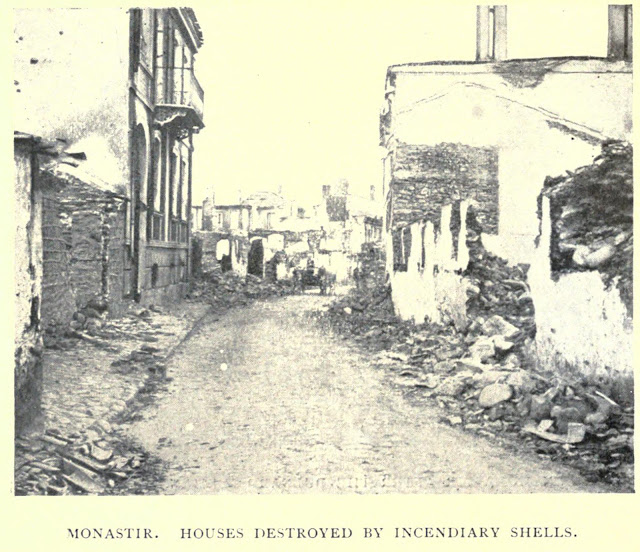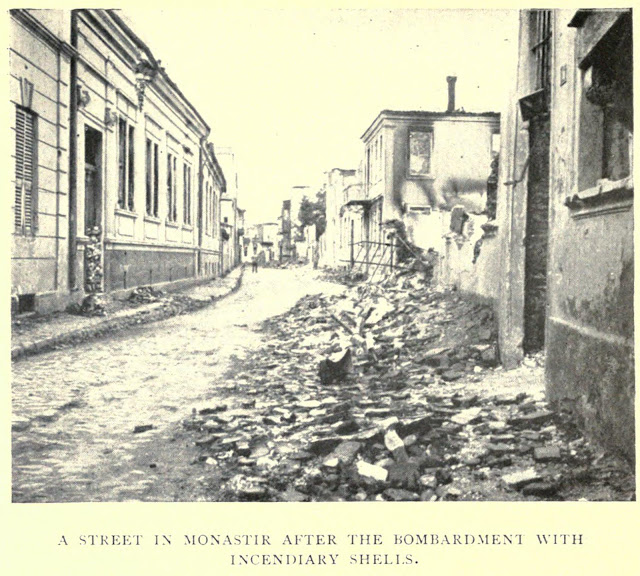It is almost impossible to recognize this town, which was once such a pleasant sight in the smiling valley of the Dragor.
There are practically no houses left untouched by the shells of a barbarous enemy.
Why do the Bulgaro-Germans rage so furiously against an open town which is, as such, protected by the laws and conventions of war ?
Why do they kill its unfortunate inhabitants by hundreds ?
(So far there have been more than 1,500 civilians killed and wounded.)The reply is easy.
The invaders, having seen their valuable prey definitely snatched from them last November, want to be revenged and, as they cannot get at their enemies to hurt them, they are inflicting as much suffering as they can upon an inoffensive population which will never be Bulgarian.
They have tried to explain their conduct to the neutrals and to the Pope, who is so indulgent where they are concerned, and in this way have tried to avoid the universal obloquy which they feel is weighing upon them, by pretending that their enemies compel them to fire upon an open town by placing guns in the city.
This is only one more lie to their account, and they are perfectly well aware of it, because their spy system has been exceptionally enterprising and accurate in Monastir. I have been some ten times in the bombarded town, and I have traversed it in every direction. Never has there been an allied gun in the centre of the city, the quarter singled out by the gunners of William of Hohenzollern and Ferdinand of Coburg, whom history will speak of as the " baby- killers."
In order to be able to reply to the enemy shells, the Allies have been compelled to place batteries in the outskirts of the town. The Germano-Bulgars know this and could perfectly well send their projectiles there without touching the town itself, with its children, its women, and its old men.
How are they going to explain the massacre of these innocents in the cellars by asphyxiating gas ?
Do they pretend that by hurling these engines which are forbidden by conventions which they themselves have signed full into the heart of the town, they will hit the Allied gunners, who are several thousand yards away from the place aimed at ?
And how can they clear themselves of the shame of the conflagration of Monastir, which they set on fire on August 17, 1917?On that date, at about two o'clock in the afternoon, they began to bombard the central part of the town with shrapnel. At five o'clock all their batteries opened fire upon the town without interruption until ten o'clock at night. More than 2,000 shells of every calibre and kind were sent, and among them many incendiary shells. Fires started everywhere, and the high wind which was blowing that day caused the conflagration to spread with great rapidity. No assistance was possible in spite of the fire- engines which the Serbs had provided in anticipation of this kind of calamity, because the Bulgaro-Germans hindered all assistance by copiously " watering " the burning zone with shrapnel and destroying the telegraphic and telephonic connections by means of which help might have been summoned from neighboring units.

Everybody had to take refuge in the cellars. It goes without saying that there were casualties.
Eight people were burnt to death, 66 injured by the flames, and 22 killed by shells.
Among all these victims there were only four soldiers, who were burnt in attempts to rescue children.
In one house the aged mother of the Roumanian Professor Georgi and his little daughter were buried beneath the wreckage of their home, which had collapsed.
Seven hundred houses fell a prey to the flames in this way.They were all in the central part of the town, to the right of King Peter Street (going towards the Dragor), and I can vouch for it that there was not an allied gun anywhere near them. But the destruction of guns was not the object of this barbarous act.
It was again revenge.
The Allied aviators had been to Prilep, and in that town, which had been cleared of its civil population, they had copiously bombarded military establishments, and it appears that a general was killed. And in order to revenge themselves for this purely military act the Bulgaro-Teutons sought to chastise the innocent civil population of Monastir.
I am no partisan of reprisals which strike at non-combatants, but when I look upon these horrors I ask myself, What are the Allies waiting for before repaying the German and Bulgarian towns in kind ?
In spite of all their sufferings, about 25,000 of the inhabitants of Monastir refused to leave their town.
A few thousands, however, have left because the fire left them without a roof over their heads. The others go on living, or rather vegetating, in their daily bombarded city. Ten months of suffering has made them philosophers. They have arranged their lives as well as they can in their unsanitary cellars, where phthisis and contagious diseases lie in wait for them. The boldest have even resumed their modest trade, and it seems odd to see the little shops, half demolished by shell-fire or the plundering Bulgars, with their twisted iron shutters only half-raised, so that they may be lowered all the more quickly whenever the bombardment begins.
The children play in the streets, but silently.A friend accosts me.
They have lost their natural gaiety since so many of their little friends are being killed day by day by the murderous engines of those who pretended to be in the vanguard of " Kultur."
He is a Serb of Serbia whose family, consisting of a wife and a delightful little boy of eight, had settled in Monastir when they fled from the bombardment of Belgrade.
I ask how they are.
The little boy, killed by a shell with ten of his little playmates as all unconscious of danger they were playing at soldiers in the street.
The wife, dead of grief.
While we are talking a well-known whirring sound approaches, swiftly followed by the bursting of shells from our anti-aircraft guns.
These are the Bulgaro-German aviators on their usual death-round over the martyr city.
Some of their bombs burst quite near us, and a few minutes later the bleeding body of a woman is brought in, a mother struck down on her way to fetch milk for her little one from the canteen of the British Serbian Relief Fund.
Will the Pope and certain neutrals still dare to plead the cause of these murderers of the innocent ?
Excerpt from the book:
THE KINGDOM OF SERBIA: INFRINGEMENTS OF THE RULES AND LAWS OF WAR COMMITTED by the AUSTRO-BULGARO-GERMANS: LETTERS OF A CRIMINOLOGIST ON THE SERBIAN MACEDONIAN FRONT By Rudolphe Archibald Reiss Published 1919
Read More: The kingdom of Serbia. Infringements of the rules and laws of war committed by the Austro-Bulgaro-Germans; letters of a criminologist on the Serbian Macedonian front>>>






0 Comments